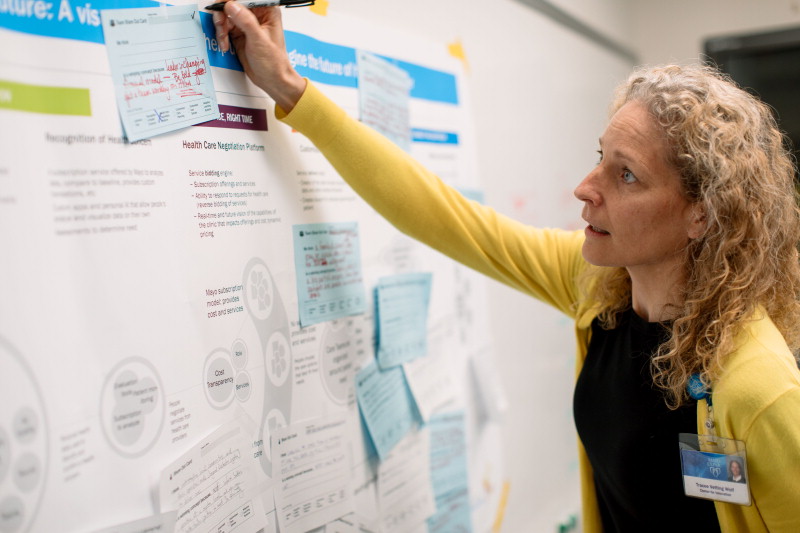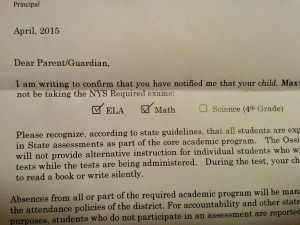The decision to opt my son out of state testing felt like an act of civil disobedience and it gave me pause; we were considering it well before Cuomo angered the teacher’s union with his education plan, which helped make our choice to opt out crystal clear. In the state of New York the results are used to determine the adequacy of his teachers (50%) along with an assessment from an outside observer (35%). And we don’t get to see the results of the test.
Teacher assessments being tied to children performance on the tests wasn’t the only reason. I couldn’t shake this feeling that my son’s access to creative well-being and enthusiasm for learning at school has been compromised. And as another mother said and has been quoted in lohud, “You know, you have to be very careful if you’re a politician about coming between a parent and their children…”. So my husband and I acted out of the compelling force to do what we thought best for our son, his future, his peers, and our community of teachers.
This test takes six days. Three days for the ELA and three days for math. They’ve finished the first three days last week and from what I hear of it so far, it’s a special form of educational torture. Estimates say that most children will struggle. Testing authorities fail to understand that growth mindset plays a far higher factor than knowledge-building in terms of a child’s ability to be college ready or job ready.
My son, on the other hand, sat in the cafeteria with the pack of books and his writing notebook. Each day of testing he was looking forward to school “I’m so excited that I get to read!” It’s been a really special time for him to be self-directed in his learning and that his learning felt self-indulgent (yay!). Instead of spending his time being demoralized, he’s engaged and empowered. He also gets to use the time to write his book; something the test prep all year prohibited him from being able to do.
The math portion happens this week. We’re continuing to do his multiplication and division flashcards each morning because I agree with the Common Core idea that attaining fluency is good. I disagree that the best way to attain it is by being timed. For most kids, this is a recipe for choking, degradation of self-worth and an opportunity for anxiety over the expectations we’ve established for our children. So we do our flashcards repeatedly, even when the other kids are backing off because the test is so arduous. And Max will get to figure out how he wants to fill his 70 minutes each day with his own learning.
I’ve heard of many school districts ostracizing the children whose parents have opted them out. Things are getting nasty in some places. Thankfully not in Ossining. I spent 40 minutes on the phone with the principle of our school about how the opting out works, how our child will be treated and wrapped up the discussion with some exciting ideas about how to differentiate his education! Our school district is exceptionally supportive and I am grateful!
What I am learning as a parent and as a creative is that opting out is indeed an act of civil disobedience. However, by opting my son out of the system, I am opting him in to something very powerful: him. With that comes tremendous personal responsibility, something that the system has been trying to compensate for. With the advent of No Child Left Behind came this sense that the system has to take responsibility to make up for the lack of empowered participation by some of its constituents. A noble idea but by taking over, self-responsibility is not part of the picture. And not all of us are cool with that. As hard as it may be, I want my family to thrive on our own terms, not be scaffolded and limited on the terms set out by the system.
I believe that education needs to allow students to have abundant ‘figure it out’ moments. Give them space to experiment, fail, wonder, be curious, have some self-direction.
Opting out is a theme in my life the past few years and really coming into sharp focus right now. There seems to be a lot of things to oppose: education, banking, corporate culture, etc. Which means there are a lot of reasons to opt in to something else — that something else being the same thing: yourself. Funny how YOU and I are the answer to the woes our society faces today. We choose. And the right answer is to choose ourselves.


Hi Tracee! I am loving this post, and how you are thinking about how state testing is tied to educators evaluations. Here in Colorado it’s the same thing. I am in favor of wanting to hate these new assessments, but almost can’t. I don’t agree in the timing of when they are taken or how they are being used. As I walked around my students and noticed the types of questions, they really are good questions. If only we could get out kids to think like that, and that deep. I do understand and hate the stigma of the standardized testing and how it conforms our students into a box and pretty much stops their own learning and creativity. But on the school’s side, doesn’t opting out hurt the numbers for the school? As small as we are, we cannot afford missing numbers. Do you know how the students that opt out are reported to the state? Are they being counted against the school? And as for moving forward, depending on how deep a teacher can dive into these scores, they do set up teachers to know where their new students are coming from…at least it gives one piece of the puzzle. So, I guess, in a nut shell, I’m on the fence about these tests.
Hi Micheale!! I think the Common Core Standards (the standards themselves and the thinking in them) are great! But how the test is being used is damaging. In Colorado, do you have access to the children’s test performance? In New York we don’t; we don’t have the ability to assess performance in order to adjust the teaching. The test’s main purpose is to assess the teacher and to provide ability to fire those whose children don’t score well under them.
An average score is used for every child not taking the test, so it doesn’t count against the school. Neither does it count for the school. It’s neutral.
And the last bit that bothers me is the strong bias toward a style of teaching/learning that, without creative thinking, tends toward a lot of worksheets, and a lot of instruction time with rote memorization. I don’t think it *has* to be that way. The strong bias is harmful to inspiring creative aptitude.
If your ability to keep your job as a teacher depended on these tests, how would you feel about that? If you are not able to see the results of the tests in order improve your classes learning, how would you feel about that?